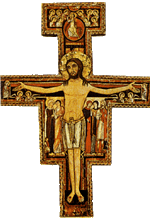| Part of the series on Communion | |
|
also known as | |
|
Theology Transubstantiation | |
|
Theologies contrasted | |
|
Important theologians | |
|
Related Articles | |
The Words of Institution are those used, inserted into a narrative of the Last Supper, in Christian Eucharistic liturgies to recall those used by Jesus on that occasion. Eucharistic scholars sometimes refer to them simply as the verba (Latin for "words").
Almost all existing ancient Christian Churches explicitly include Words of Institution in their Mass or Divine Liturgy, and consider them necessary for the validity of the sacrament. The Holy Qurbana of Addai and Mari does not explicitly contain Words of Institution. This Anaphora is used by the Assyrian Church of the East and (often in adapted form) by the Chaldean Catholic Church and others of the same tradition. The Roman Catholic Church has explicitly recognized its validity, saying that "the words of Eucharistic Institution are indeed present in the Anaphora of Addai and Mari, not in a coherent narrative way and ad litteram, but rather in a dispersed euchological way, that is, integrated in successive prayers of thanksgiving, praise and intercession."[1]
No formula of Words of Institution is claimed to be an exact reproduction of words that Jesus used, presumably in the Aramaic language, at his Last Supper. The formulas generally combine words from the Gospels of Mark, Matthew and Luke and the Pauline account in 1 Corinthians 11:24-25. They may even insert other words, such as the phrase "Mysterium fidei" which for many centuries was found within the Roman Rite Words of Institution, until removed in 1970.
The Catholic Church[]
The Words of Institution are presented in the 1973 English translation of the Roman Missal in the form given in the following italicized text. The distinction here made by bolding is not found in the Missal.
- Take this, all of you, and eat it:
- this is my body which will be given up for you.
- Take this, all of you, and drink from it:
- this is the cup of my blood,
- the blood of the new and everlasting covenant.
- It will be shed for you and for many
- so that sins may be forgiven.
- Do this in memory of me.
From the time of Peter Lombard on, the prevailing theology of the Catholic Church considered the words in bold above to be on their own the necessary and sufficient "sacramental form" of the Eucharist. This theology was sanctioned doctrinally by Pope Benedict XII's Decree for the Armenians, issued after the Council of Florence,[2] if this is interpreted as meaning that nothing more than "the words of the Savior" is needed for effecting the sacrament.[3] This same Decree declared that the matter of ordination was the giving to the ordinand of objects connected with their ministry,[4] an idea now discarded and even then contradicted by the Catholic Church's recognition of the validity of ordinations in Churches that had no such ceremony in their rite of ordination.[3]
This theological opinion about the necessity and sufficiency of pronouncing certain parts of the Words of Institution (the eight words bolded in the English translation given above) is not included in, for instance, the Catechism of the Catholic Church, published in definitive form in 1997. On 17 January 2001 the Congregation for the Doctrine of the Faith declared valid the Holy Qurbana of Addai and Mari, a probably second-century anaphora in which the Words of Institution are not spoken.[5] The Guidelines for Admission to the Eucharist between the Chaldean Church and the Assyrian Church of the East issued by the Pontifical Council for Promoting Christian Unity in agreement with the Congregation for the Doctrine of the Faith and the Congregation for the Oriental Churches on 20 July 2001 say that "the words of the institution of the Eucharist are in fact present in the anaphora of Addai and Mari, not in the form of a coherent narration and in a literal way but in a euchological and disseminated manner, that is to say they are integrated in the prayers of thanksgiving, praise and intercession which follow." These prayers in fact speaks of "the commemoration of the Body and Blood of your Christ, which we offer to you on the pure and holy altar, as you have taught us in his life-giving Gospel."[6]
It has therefore been argued that it is the prayer as a whole, not some isolated words within it viewed almost as a magic formula, that is efficacious in the sacrament, and that the Words of Institution that Jesus himself spoke at his Last Supper are consecratory at every Eucharist,[3] whether they are repeated or only implied, in accordance with the teaching of Saint John Chrysostom: "That saying, 'This is my body', once uttered, from that time to the present day, and even until Christ's coming, makes the sacrifice complete at every table in the churches."[7]
While thus accepting as valid the Anaphora of Addai and Mari even when the Words of Institution are not explicitly spoken, the document of the Pontifical Council for Promoting Christian Unity "warmly invites" an Assyrian minister celebrating the Eucharist when Chaldean Christians are participating to insert the Words of Institution in that circumstance, as permitted by the Assyrian Church itself.[8]
Eastern Christian Churches[]
In the Eastern Orthodox and Greek-Catholic Churches, the Words of Institution are the only portion of the Anaphora that are spoken aloud by the priest.
The specific words spoken by the priest differ, depending upon which form of the Divine Liturgy is being celebrated:
- Liturgy of St. John Chrysostom:
For the bread: "Take, eat: this is My Body, which is broken for you for the remission of sins."
For the wine: "Drink of it, all of you: this is My Blood of the New Testament, which is shed for you and for many, for the remission of sins."
- Liturgy of St. Basil the Great:
For the bread: "He gave it to His holy disciples and apostles, saying: 'Take, eat: this is My Body, which is broken for you for the remission of sins.'"
For the wine: "He gave it to His holy disciples and apostles, saying: 'Drink of it, all of you: this is My Blood of the New Testament, which is shed for you and for many, for the remission of sins.'"
Orthodox Christians and some Eastern Catholic Churches do not interpret the Words of Institution to be the moment the "Holy Gifts" (bread and wine) are changed into the Body and Blood of Christ. In fact, they do not define a specific moment of change; however, they understand the process to be completed (perfected) at the Epiclesis (the calling-down of the Holy Spirit upon the Gifts.
The Liturgy of the Presanctified Gifts does not contain the Words of Institution, since it is actually a Vespers service at which the faithful receive from the Reserved Mysteries (Sacrament) which were Consecrated the Sunday before (hence the name: "Pre-sanctified").
Protestant denominations[]
Protestant denominations generally, with the exception of the Anglican Communion and Lutheranism, rely exclusively on the words of St. Paul as recorded in 1 Corinthians 11:23-26. (ESV):
- "For I received from the Lord what I also delivered to you, that the Lord Jesus on the night when he was betrayed took bread,
- and when he had given thanks, he broke it, and said, 'This is my body which is for you. Do this in remembrance of me.'
- In the same way also he took the cup, after supper, saying, 'This cup is the new covenant in my blood. Do this, as often as you drink it, in remembrance of me.'
- For as often as you eat this bread and drink the cup, you proclaim the Lord's death until he comes."
Protestantism has typically utilized the words of institution as a central part of its Eucharistic liturgy, though precise traditions vary by denomination. The debate over the force and literalness of the words of institution underlies the arguments between consubstantiation and transubstantiation. Most of the established churches in the Protestant tradition employ a mirroring of Paul's words surrounding the words of institution, while Congregationalist and Baptist churches use the words themselves without the full citation of Paul's wording.
Current trends in Methodist thought would require both the verba and an epiclesis for a Prayer of Thanksgiving, which bridges Western and Eastern thought.
Lutheran churches[]
The Lutheran liturgy differs from that of other Protestants by using a conflation of the four versions of the words of institution. Luther's Small Catechism shows this,
"Our Lord Jesus Christ, on the night when he was betrayed, took the bread, and when he had given thanks, he broke it and gave it to his disciples and said, 'Take; eat; this is my body which is given for you. This do in remembrance of me.' In the same way he also took the cup after the supper, and when he had given thanks, he gave it to them saying, 'Drink of it, all of you. This cup is the New Testament in my blood, shed for you for the forgiveness of sins. This do, as often as you drink it, in remembrance of me.'"[9]
By doing so, they include the phrase "My blood, which is shed for you for the forgiveness of sins..." This reflects Lutheran sacramental theology in which the sacrament is a means of grace and actively forgives sins.
References[]
- ↑ Guidelines for admission to the Eucharist between the Chaldean Church and the Assyrian Church of the East
- ↑ "The words of the Savior, by which He instituted this sacrament, are the form of this sacrament; for the priest speaking in the person of Christ effects this sacrament. For by the power of the very words the substance of the bread is changed into the body of Christ, and the substance of the wine into the blood" (Denzinger 698, in the old numbering)
- ↑ 3.0 3.1 3.2 Robert F. Taft, SJ, Professor Emeritus of Oriental Liturgy, Pontifical Oriental Institute, Rome: Mass Without the Consecration? The Historic Agreement on the Eucharist between the Catholic Church and the Assyrian Church of the East promulgated 26 October 2001
- ↑ Denzinger 701, in the old numbering
- ↑ "A long and careful study was undertaken of the Anaphora of Addai and Mari, from a historical, liturgical and theological perspective, at the end of which the Congregation for the Doctrine of Faith on January 17th, 2001 concluded that this Anaphora can be considered valid. H.H. Pope John Paul II has approved this decision" (Guidelines for admission to the Eucharist between the Chaldean Church and the Assyrian Church of the East, 3. The Anaphora of Addai and Mari).
- ↑ A. GELSTON, The Eucharistic Prayer of Addai and Mari 121-123, quoted in Taft
- ↑ Homily on the Betrayal of Judas (De proditione Judae hom. 1/2, 6), PG 49:389-390, quoted in Taft
- ↑ Guidelines, 4. Guidelines for admission to the Eucharist
- ↑ The Small Catechism VI.4; cf. The Book of Concord: The Confessions of the Evangelical Lutheran Church, Robert Kolb et al., eds. (Minneapolis: Fortress Press, 2000), 362
External links[]
- Catechism of the Catholic Church - The sacrament of the Eucharist
- Guidelines For Admission To The Eucharist Between The Chaldean Church And The Assyrian Church Of The East
- Fortescue, Adrian (1908). "Canon of the Mass". the Catholic Encyclopedia. Robert Appleton Company. http://www.sanctamissa.org/en/resources/articles/canon-of-the-mass-fortescue.html.
- Guéranger, Prosper (1885). "Explanation of the Prayers and Ceremonies of Holy Mass". http://www.sanctamissa.org/en/spirituality/saints-in-the-roman-canon.html.
- Canon of the Mass of the 1962 Roman Catholic Missal with MP3 Audio (with English translation)
Bibliography[]
- Cross, F. L., ed. The Oxford Dictionary of the Christian Church. London: Oxford UP, 1974.
| ||||||||||||||||||||||||||||||||||||||||||||
| ||||||||||||||||||||||||||||||||||||||||||
| ||||||||||||||||||||||||||||||||
| |||||||||||||
| ||||||||||||||||||||
sv:Instiftelseorden



